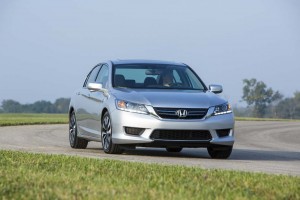
The Honda Accord lags slightly behind the Toyota Camry - but it leads its segment if you look only at retail sales.
“A sale isn’t always a sale,” or so says John Mendel, the top American executive at Honda, which has long steered clear of the daily rental and other fleet sales that prop up many of its competitors’ sales charts.
Honda has traditionally focused its marketing efforts on the retail side of the market and there, it claims, it has been gaining ground. In fact, the Japanese brand claims to now be the retail sales leader in four of the largest non-truck segments in the U.S. auto market with the midsize Civic, compact Accord, Odyssey minivan and CR-V crossover.
Those powerhouse product lines helped Honda achieve a 16.2% increase in retail sales for the first nine months of 2013, while capturing a 16.1% share of the American market. During the same period in 2012, Honda held a 15.8% share of the retail market.
“By the time the dust settles, we expected we’ll set an all-time record Honda,” in 2013, added Mendel during a conference call with reporters. That’s all the more significant, he added, since the recovering U.S. auto industry is still operating about 1.5 million units short of its previous peak.
(Honda Accord named “Green Car of the Year.” Click Here for the full story.)
Honda’s decision to emphasize its retail performance isn’t surprising considering its long-running decision to stay out of fleets, large and small. While there are some lucrative corporate markets, industry analysts note that rental markets usually yield low profits and, worse, they often wind up competing directly with a manufacturer’s franchise dealers once cars are pulled from rental service and resold. Fleet sales, emphasized Mendel, often have a negative impact on residuals – think trade-in values.
Some manufacturers defend fleet business. Ford, in particular, contends fleets can also yield fat profits, especially when major construction firms, or conglomerates like a GE or AT&T buy thousands of vehicles at a time.
But Honda shows little inclination to reverse its position. Of the more than 280,000 Accord sedans sold between January and the end of September, less than 2,000 went to fleets, according to Mendel. By comparison, Toyota sold about 48,000 Camry sedans to fleets, based on data from tracking firm RL Polk. Though it lagged in retail volume, at 265,377, that was enough to give the bigger Japanese firm’s midsize model a substantial overall lead over the Accord overall.
(Honda reveals FCEV hydrogen car – plans to put vehicle into production by 2015. Click Here for the details.)
Looking forward, Mendel said preliminary data suggests overall industry sales for November will run slightly above year-earlier numbers, though there are signs a number of key makers will be down for the month. Honda itself expects to pick up about 3% in total sales.
Even when adding in fleet, Honda has a strong year going. It is chasing Toyota for sales leadership overall, and a number of its products remain segment leaders even when going up against brands that rely heavily on fleet business.
The Civic, noted Mendel, is number one among compact models while the Accord is a strong second. Odyssey has narrowly nudged past the long-time minivan leader Chrysler, while the CR-V recently snatched leadership in the compact crossover niche from the Ford Escape.
